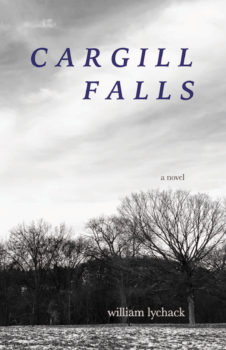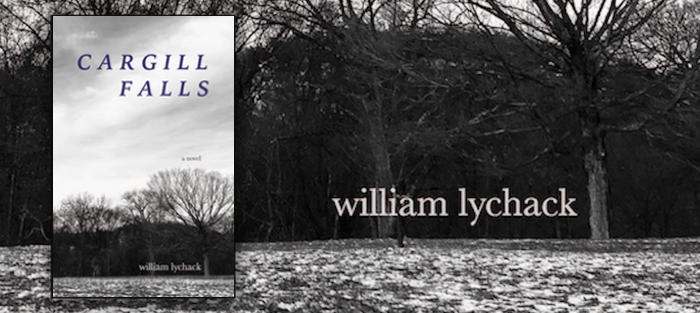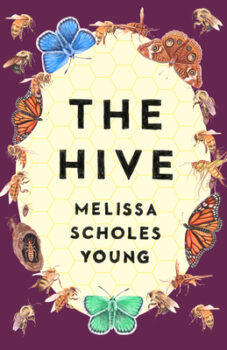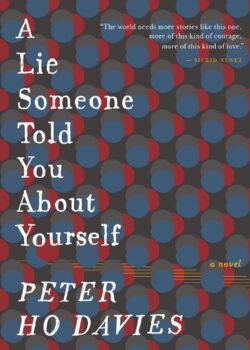William Lychack’s Cargill Falls (Braddock Avenue Books) is an exquisite novel, and I don’t use that word lightly. His language is a finely tuned and sensitive instrument, capable of expressing subtle gradations of human emotion and almost indiscernible turnings in the inner emotional lives of his characters. Highly imagistic and almost elegiac in its rumination of the past, it paints a detailed, nuanced portrait of a community, a group of friends, and an era.
The book’s story is not complex. A grown-up William Lychack looks back on his adolescence in Cargill Falls, Connecticut, an “old crappy mill town” where “boys were supposed to get into at least a little bit of trouble.” Young William, then known as Mouse, finds a heap of trouble with his friend Brownie: a military handgun left behind in the woods. We watch, up close and in slow motion, as possession of the gun changes the boys not only in that moment, but permanently. Brownie’s tragedy is the driving force of the novel, since he will—as the narrator tells us early on—end up dead by suicide a few decades after the events of the book.
The narrative in Cargill Falls has a dreamlike quality that Lychack achieves with the deft use of several fictional tools to move the past in and out of focus. His narrator shifts continuously and seamlessly between a contemporary retrospection and an in-the-moment past, giving the story a sense of being seen through a haze of memory. Within individual scenes, Lychack mixes “live” dialogue with summarized, indirect dialogue, adding to the sense of double vision. He also makes wonderful use of the “possible voice”—a speculative exploration of how things might have turned out differently if Mouse and Brownie had made different decisions.
With these tools establishing the framework of the book, Lychack lets loose his powers of evocative language. His talent for images and succinct, often metaphorical turns of phrase never lets the reader down: “I didn’t trust my fingers to be empty”; “that feathery brush of fear in my room”; “water the color of a magnet”; “Home, and the dark becomes a towel over my mouth.” With such a well-tuned faculty of language, Lychack captures the small emotional movements inside of people exceptionally well—a sure sign of a writer who’s deeply engaged in getting the emotional truth of his characters right.
 This attention to figurative language is not mere style. Cargill Falls asks big questions about life, particularly about the ways masculinity is passed on through the generations in America. Mouse, whose father has died, “would have traded everything for just the chance of a father.” He keenly observes the combative relationship between Brownie and his father, in which “hatred and love flushed up against each other,” but his fatherlessness leaves him uncertain as to the steps of the complicated father/son dance. While Brownie hurls himself into common inherited patterns of American masculinity, Mouse is held back because he has no father to dance with. As someone who lost his father at the same age as Mouse did, I found Lychack’s depiction of this state of fatherlessness compelling and emotionally true; it is one of the strengths and pillars of the book.
This attention to figurative language is not mere style. Cargill Falls asks big questions about life, particularly about the ways masculinity is passed on through the generations in America. Mouse, whose father has died, “would have traded everything for just the chance of a father.” He keenly observes the combative relationship between Brownie and his father, in which “hatred and love flushed up against each other,” but his fatherlessness leaves him uncertain as to the steps of the complicated father/son dance. While Brownie hurls himself into common inherited patterns of American masculinity, Mouse is held back because he has no father to dance with. As someone who lost his father at the same age as Mouse did, I found Lychack’s depiction of this state of fatherlessness compelling and emotionally true; it is one of the strengths and pillars of the book.
The handgun that the boys find in the woods is naturally bound up with these issues of masculinity, though Lychack manages to make its role in the novel feel organic. More important, the novel never verges on preachiness; it looks straight down the barrel of how firearms can literally affect young men’s minds. The gun enhances Mouse’s sense that he is “a bad person who had to choose to be good,” and he thinks about how he has to “guard against [himself] always.” The gun comes to symbolize an adult freedom and power that the boys can feel despite not fully comprehending. Mouse claims that having the weapon allowed the boys, if they wished, to “have stacked a pile of wood any way we damn well pleased, no matter how picky someone’s father might be.” Yet the retrospective narrator and the reader understand the profound misunderstanding of the weapon’s potential.
The sense of control that comes with a weapon is most palpable when Mouse worries that Brownie is going to kill their friend Breeze. But instead he lets his friend shoot the gun, and it ends up being a transformative experience—Breeze becomes “all muscle and athlete, playing basketball, running track.” The gun, that symbol of an adulthood the boys can’t truly understand, has invisible consequences. It turns Brownie, so attracted to its power and yet the most reluctant to fire it, inward toward his own shame and self-conflict. It turns Mouse, already an introspective kid, into one who begins trying to make sense of the world beyond himself. “When did we stop letting ourselves feel for things?” Mouse asks. He seems to know that this question applies not only to others, but to the boys themselves—that they will be among the very things then let themselves stop feeling for.
Cargill Falls is also a formally intriguing book thanks to its relationship with nonfiction and particularly the lyric essay, with which it shares many common features. While some degree of autobiographical bleed-through is inevitable in fiction, Lychack admittedly mines from his own life and essentially breaks the fourth wall in talking to the reader about it. The novel includes family pictures and excerpts from a military manual on the care of firearms. Its use of language—the fragments, the shifts in perspective, the leaping into rabbit holes of the past—would be familiar to readers of the lyric essay, and at times the book feels like it has more in common with that genre than with the traditional novel.
However, Lychack uses these tools so deftly that this genre-blurring never seems anything but intentional. In reading Cargill Falls I was reminded of a conversation I once had with John Edgar Wideman, who is well-known for working along the fuzzy borderline between fiction and nonfiction. When I asked him how he handled going back and forth between genres in the same work (and even on the same page), Wideman said he didn’t worry about it as long as he was telling his readers the truth. I got that same feeling from Cargill Falls. Lychack isn’t playing formal games as he mines his own life. He’s looking back at the child he was, this curious fatherless Mouse, and trying to show us the truth of his life. And in the story of Mouse, who we see taking his first tentative stabs at making sense of the world, lies the seed of William Lychack, an author of exquisite storytelling.






